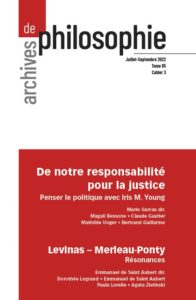 Volume 85, Issue 3, July-September 2022
Volume 85, Issue 3, July-September 2022
On our responsibility for justice: Thinking the political with Iris M. Young
 Marie Garrau, On our responsibility for justice: Thinking the political with Iris M. Young. Foreword
Marie Garrau, On our responsibility for justice: Thinking the political with Iris M. Young. Foreword
Magali Bessone, The concept of integration, essentially a by-product of racial desegregation?
This article first proposes to contrast Elizabeth Anderson’s arguments on integration as an imperative of justice with those of Iris Marion Young who criticizes the ideal of integration and prefers an ideal of inclusion as “differentiated solidarity.” I then proceed to test the arguments promoting or criticizing integration by placing them in a French context, where the concept has a very different semantic field and sociohistory than in the North American context. The article will propose a qualified defense of the concept of integration, not as an “imperative” or an “ideal” but rather as an “essential by-product” of racial desegregation.
Claude Gautier, The effective democratization of society. Supporting the comparison between Dewey and Young
Dewey’s constitution of “publics” [1927] and Young’s inclusive deliberation [2000] aim at solving an analogous problem, that of the effective democratization of society. In order to achieve this, it is necessary on both sides to return to the political concept of the “group” and to define it not ontologically—the criterion of identity, for example—but functionally as an operative form of structuring and representing common interests. One of the conditions for such an approach to “groups,” however, is the construction of a shared knowledge. It will be shown that the realization of this condition remains problematic and that, consequently, the difficulties Dewey faced with regard to “publics” still remain in Young’s theory of inclusive democracy.
Mathilde Unger, Redefining political responsibility in a global age
This article examines Young’s notion of “political responsibility” as a response to the problem of global injustice. It attempts to explain why the author takes the model of individual responsibility as a starting point, discarded since the nineteenth century in favor of social solidarity, and shows that Young’s “political” responsibility paradoxically leads to the disqualification of public action.
Bertrand Guillarme, Injustice systémique et responsabilité des individus
The relationship established by Young between an agent’s participation in the structural dynamics that produce injustice and this agent’s responsibility to fight injustice politically is intuitively attractive, but it has to be supplemented in order for the social connection theory of responsibility to be sound. What is the meaning of the responsibility assigned by Young to participants in the system? How is this responsibility normatively justified? How can agents implement it?
Levinas and Merleau-Ponty: Resonances
Emmanuel de Saint Aubert, Levinas and Merleau-Ponty: Resonances. Foreword
Dorothée Legrand, The other responds. Reading Merleau-Ponty with Levinas
The reading of Levinas and Merleau-Ponty that is proposed here is oriented by a principle of irreducibility borrowed from Roland Barthes: Do these authors assume a “desperate resistance to any reductive system,” and if so, how? Against the reduction of a human to humanity and to Being, Levinas engaged his thought in the ethics of the other. Levinas reads in Merleau-Ponty an ontology which, while certainly not brutal, is nonetheless inhuman in that it privileges the generality of the flesh over the singularity of each human. Different conceptions of the body and of language are involved here, whose clinical implications we will seek to show by confronting them with the relation to the other that Lacanian psychoanalysis operates with.
Emmanuel de Saint Aubert, Other, same, common. Merleau-Ponty’s perspective
We examine how Merleau-Ponty, in close connection with his personal conception of being, tackles certain themes explored by Levinas, including desire, transcendence, alterity, and responsibility. Marked by a great attention to the perceived world, his ontology emphasizes the negativity of being as a springboard for our birth and coexistence. Undefined and relative, resistant and up-holding, being works our flesh in a dialectic of limitation and openness, to the point of freeing us from the ambivalence that hinders our relationships and concepts. Rich in ethical virtualities, this ontology positions itself against Sartre, believes itself incompatible with Heidegger, and sharply contrasts with Levinas—even with the reading that Levinas has made of it.
Paula Lorelle, The other sense of reason. Levinas and Merleau-Ponty
In “La philosophie et l’éveil,” Levinas invites us to conceive a “rationality in another sense.” In each of its terms, this expression opens a dialog with Merleau-Ponty, suggesting different levels of depth and eventually implying a common conception of reason. Levinas first appeals to another kind of reason that recalls both the “first rationality” of his Totality and Infinity and Merleau-Ponty’s numerous references to a new form of rationality. Levinas then discusses the sense of this rationality: this sense that, in Merleau-Ponty too, unfolds beneath the words, within the sensual thickness of the flesh. And this sense is eventually other—defined both by Levinas and Merleau-Ponty in its very alterity as a “difference” or a “gap” (“écart”). Yet, one still needs to define this “gap” whose meaning differs from Levinas to Merleau-Ponty and from which it will only be possible to suggest in conclusion this other sense of reason.
Agata Zielinski, Ethics of the sensitive: Thinking about relationships differently
By undermining reciprocity, certain situations of illness come to question the recognition and belonging of the other to a common humanity. Reading Merleau-Ponty and Levinas allows us to sketch a phenomenology of the encounter in the absence of communication. Flesh in the one and vulnerability in the other reveals a proximity in spite of oneself. The uncanny of the other refers to a primordial experience of distress and dependence that is common to us all. From this, an ethic of proximity can be constituted from the sensitive.
Notes de lecture
Michel Foucault, Binswanger et l’analyse existentielle, Phénoménologie et psychologie, and La question anthropologique. Cours. 1954-1955
Read by Philippe Chevallier.
Paul Ricœur, La religion pour penser. Écrits et conférences 5
Read by Guilhem Causse.
